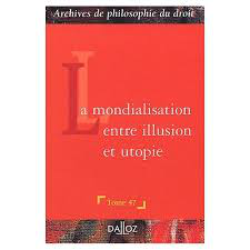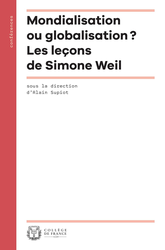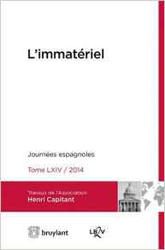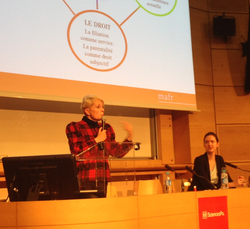Compliance and Regulation Law bilingual Dictionnary

The liberal professions such as lawyers, doctors or accountants are organized into professional bodies and consider that they can not be reduced to mere companies operating in markets because the service they offer includes a human and moral dimension, translated by ethics, under the supervision of their internal professional organization, particularly through ex ante their power to adopt their own standards of behavior, and in ex post, the disciplinary power of their professional order.
Competition law refutes this organization from the Old Regime and simply considers the "markets of legal or medical services, firms having to compete with each other and not having to organize the sector, by or fixing Numerus clausus, etc.
In the perspective of regulation, the liberal professions are, on the contrary, the ones most pertinento organize self-regulation in a globalized economy from the moment they give rise to a credible surveillance system and thus deserve the confidence of customers and public regulators.
Thesaurus : Doctrine

Référence complète : Salah, M., La mondialisation vue de l'Islam, in Archives de Philosophie du Droit, La mondialisation entre illusion et utopie, tome 47, Dalloz, 2003, 27-54.
La mondialisation apparaît comme une occidentalisation des cultures et du droit. L'Islam qui prend forme juridique devrait se l'approprier sans se dénaturer. La réussite d'un tel processus difficile dépendra de la qualité de la régulation qui sera mise en place.
Lire une présentation générale de l'ouvrage dans lequel l'article a été publié.
Les étudiants de Sciences po peuvent via le drive lire l'article dans le dossier "MAFR - Régulation".
Sept. 1, 2022
Thesaurus : Doctrine

► Full Reference: M.-E. Boursier, "Les buts monumentaux de la compliance : mode d'expression des États" ("Compliance Monumental Goals: States' mode of expression"), in M.-A. Frison-Roche (ed.), Les Buts Monumentaux de la Compliance, coll. "Régulations & Compliance", Journal of Regulation & Compliance (JoRC) and Dalloz, 2022, p. 467-474.
____
📕read a general presentation of the book, Les Buts Monumentaux de la Compliance, in which this article is published
____
► Summary of the article (done by the Journal of Regulation & Compliance): "Monumental goals" are the raison d'être of Compliance and give it meaning: they are enriched with a political objective making it rise to the status of true legal norms. Compliance Law emerged from the confrontation of States with globalisation, leading to an eviction of traditional legal notions. The monumental goals are the expression of public policies that can be deployed in such a context, thanks to the articulation that Compliance builds with private stakeholders, who spontaneous or constrained contribute.
Through this new Law, States regain their agility face to markets. Indeed, these monumental goals justify this new responsibility weighing on the companies and the new powers that the States express beyond their traditional borders.
________
Feb. 2, 2021
Thesaurus : Doctrine
► Référence complète : L. d'Ambrosio, "Le devoir de vigilance : une innovation juridique entre continuités et ruptures", Droit & Société, n° 106, 2020, p. 633-648.
____
► Résumé de l'article (fait par l'auteur) : "Cette contribution analyse les origines de la notion de devoir de vigilance. A cette fin, elle reconstruit les rapports de filiation entre cette notion et celle de "due diligence", devenue ces derniers temps une notion clé pour caractériser la responsabilité des Etats et des entreprises concernant les atteintes graves a des valeurs protégées par le droit international (environnement, santé, droits de l'homme, etc.). L'article vise ainsi à repérer les lignes de continuité ainsi que celles de rupture qui marquent l'introduction et la traduction du devoir de vigilance dans le système juridique français : les unes comme les autres permettront en effet de présenter les contours de cette innovation juridique et d'en saisir la portée dans le cadre du plus large processus d'institution d'une responsabilité juridique des entreprises dans l'horizon de la globalisation."
________
Nov. 27, 2020
Thesaurus : Doctrine

Full reference: Lagarde, P., Preface of Le tournant global en droit international privé, Muir-Watt, H., Biziková, L., Brandão de Oliveira, A., Fernández Arroyo, D. P., Ma, M. (ed.), Editions Pedone, 2020, pp. 9-14
Nov. 18, 2020
Teachings : Generall Regulatory law

La géographie est un élément qui demeure d'une grande pertinence dans la mise en place et la mise en œuvre des différentes régulations, ne serait-ce que parce que l'Histoire ne se pense pas sans la géographie, et que l'État ne se pense pas ni sans l'Histoire ni sans la Géographie, puisque dans un rapport consubstantiel avec le territoire et donc la clôture. Le Droit International Public repose sur cela, pour que les Etats, sujets de Droit international agissent dans un second temps dans l'espace international et notamment s'engagent les uns par rapport aux autres (traités internationaux).
Pourtant, confronter la Régulation et la Géographie conduit dans un premier temps à une aporie. En effet, à première vue, la Régulation, parce qu'expression de l'État, ne pourrait être que légitime sur un territoire national et, si on le décline juridiquement, qu'inséré dans le système juridique français. Or, le système juridique français étant construit d'une façon très particulière, sur la summa divisio du Droit public et du Droit privé, cela conduit certains à croire que le Droit de la Régulation serait une sorte de sous-branche du Droit public, puis à concentrer à titre principal l'attention sur la question des Autorités administratives indépendantes (AAI), puisque cela est familier au Droit public, tandis que les économistes bâtissent les règles qui gouvernent à travers le monde la Régulation sur un modèle qui serait totalement uniforme quelque soit l'endroit où il s'applique. Ce décalage conduit à ce qui peut apparaître à certains comme une sorte d"invasion" des catégories anglo-saxonnes, ne serait-ce que par le vocabulaire utilisé, lequel transporte avec lui les concepts du droit anglo-américain et ses méthodes. Il est vrai qu'en matière de régulation, les États-Unis, dont le droit a ses racines dans le droit britannique, a tendance (parce qu'ils en ont la puissance de faire) a appliquer leur droit d'une façon de fait extraterritoriale, par le vocabulaire et les concepts. On mesure ainsi que la puissance de droit dépend souvent de la puissance de fait. A cela, s'ajoute le relais de l'autorité, celle de la Cour suprême des États-Unis, par exemple, ou de la Cour de Justice de l'Union européenne. L'on finit par se dire que tout est, en matière de régulation, affaire de "coutume", c'est-à-dire de façon où les choses se font là où elles se font (conception allemande classique).
Dans cette grande dispute des territoires, l'on ne peut échapper à ces sorties, non seulement en raison des jeux de pouvoirs, mais parce que la Régulation est un appareillage technique sorti des objets, lesquels ne tiennent pas dans les frontières, la frontière étant une notion juridique affaiblie par le Droit économique, voire ennemie de celle-ci. Le rapport entre la Régulation et la Géographie va dès lors changer selon les secteurs, ce rapport demeurant étroit si l'objet technique régulé est corporel et immobile, le rapport se brisant si l'objet est immatériel. Mais la financiarisation de l'économie remet en cause cette gradation puisqu'elle dématérialise la corporéité de l'économie.
Plus encore, la question est de savoir si la Régulation doit prendre acte ou doit contrer l'habileté des opérateurs qui peuvent se soustraire au territoire, par le seul fait de bouger ou, par exemple, en créant des personnes morales ou bien en n'en créant pas (par l'action économique extérieure via de simples succursales non responsables). Si l'on estime que la Régulation est une théorie libérale qui pallie les défaillances techniques de marché, le Droit laisse cette habileté se déployer, voire on l'encourage. Si le Droit de la Régulation défend d'autres objectifs, cette habileté sera contrée. Des cas illustrent ces habiletés qui se confrontent, celles des opérateurs, des politiques et des régulateurs : le cas Péchiney- Triangle ou le cas BNPP, par exemple.
Se reporter au plan de la leçon 5
Consulter les slides de la leçon 5
Accéder au plan général du cours.
Consulter la bibliographie générale du cours
Consulter le Glossaire du Droit de la Régulation et de la Compliance
Consulter la Newsletter MAFR - Law, Compliance, Regulation
Consulter ci-dessous la bibliographie spécifique à la Géographie & la Régulation:
Aug. 10, 2020
Newsletter MAFR - Law, Compliance, Regulation

Full reference : Frison-Roche, M.-A., The practical utility to have a firm definition of "Compliance", Newsletter MAFR - Law, Compliance, Regulation, 10th of August 2020.
Read by subscribing the other news in the Newsletter MAFR - Law, Compliance, Regulation
Summary of the news
Some says that defining Compliance is a theoretical and non useful exercice that should be left aside to tackle the study of concrete technical cases. However, to be able to use Compliance tools, it is first necessary to have a clear, firm and simple idea of what is Compliance. Moreover, the future of this new branch of law intensely depends on the definition we choose to use.
Compliance Law gives to some crucial private firms new responsibilities such as the one to fight against global dangers or the one of saving the planet. In this, Compliance Law can be perceived as a kind of new deal between the private sector and public authorities, with the only difference that this time the consent of the private sector is not required.
Some would say that the concretization of such projects is the duty of the State and that private firms, if they must respect the rules, do not have to find a way to concretize a "monumental goal". However, the world face new and systemic dangers in the face of which the State alone is powerless, technically or geographically, and against which crucial companies can act.
It is not about, as some advocate to put human being aside of Compliance Law by letting machines decide. It is about placing the human being and its protection at the heart of Compliance Law. In this, Compliance Law can become a new humanism.
To go further, read Marie-Anne Frison-Roche's working paper, The Dreamed Compliance Law

April 24, 2020
Publications

Its subject is the confrontation between the current health crisis situation and the Compliance Law.
Summary. After defining Compliance Law, distinguishing the procedural and poor definition and the substantial and rich definition, the starting point is to admit the aporia: the type of health crisis caused by Covid-19 will be renewed and it is imperative to prevent it, even to manage it, then to organize the crisis exit. Public Authorities are legitimate to do so, but because this type of crisis being global and the State being consubstantially linked to borders, States are hardly powerful. Their traditional International Law shows their limits in this current crisis and one cannot hope that this configulration will improve radically.
In contrast, some companies and markets, notably the financial markets, are global. But the markets are not legitimate to carry out such missions and counting on the generosity of certain large companies is far too fragile in front of the "monumental goal" that is the prevention of the next health crisis, crisis which must never happen.
How to get out of this aporia?
By Compliance Law, basis of, in a literal and strong sense, the "Law of the Future".
We need to be inspired by the Banking and Financial Compliance Law. Designed in the United States after the 1929 crisis to tend towards the "monumental goal" of the absence of a new devastating crisis in the country and the world, this set of new legal mechanisms gave duty and power of supervision, regulation and compliance to market authorities and central bankers. These are independent of governments but in constant contact with them. Today, they claim to have as first priority the fight against climate change. Now and for the future, they must also be given the responsibility and the powers to prevent a global health disaster, similar to a global ecological disaster, similar to a global financial disaster. This does not require a modification of the texts because their mandate consists in fighting instability. Stability must become a primary legal principle, of which the fight against monetary instability was only a first example. By the new use that central banks must make of it by preventing and managing health crises, Compliance Law will ensure that the future will be not catastrophic.
Jan. 16, 2020
Thesaurus : Doctrine
Reference: Patrick BOLTON - Morgan DESPRES - Luiz Awazu PEREIRA DA SILVA - Frédéric SAMAMA - Romain SVARTZMAN, The green swan: central banking and financial stability in the age of climate change, Banque des Règlements Internationaux, Janvier 2020

Updated: Sept. 24, 2019 (Initial publication: Aug. 31, 2019)
Publications

Summary : In August 2019, about the fire devastating the Amazon, the French Minister of Ecology says that this fact "is not just the business of a state" (n'est pas que l'affaire d'un Etat). This assertion denies the postulates of Public International Iaw (I). This supposes a new system, based on the idea that the power of the State on its territory is erased when the object that is there is no longer related to this "part" but to the All that is Universe (II). Let's accept the augur. First question: if it is not only the case of a State, whose business is it? (III). Second question: to anticipate the other cases that fall under this regime, what should be the criteria in the name of which the All will have to prevail over the part and who will then take care of the case of which the "local" State is divested? (IV). Because the perspective goes beyond the environment, beyond Brazil, beyond the States. It leads to Compliance Law animated by "monumental goals" that are the concern for the Universe and humans, in a humanist spirit. Let's go.
___
On August 27, 2019, on the French radio France Inter, Elisabeth Borne, French Minister of Ecology (Transition écologique) expresses it clearly: "Quand on est sur un enjeu tel que l'Amazonie, ça n'est pas que l'affaire d'un État", that can be translated : "When we are on a stake such as the Amazon, it is not only the business of one State ".
Starting from one case, "the Amazon", the Minister, thus taking up the position of the French President, associates a general consequence: "it is not only the affair of one State".
This is not a trivial sentence.
This affirmation denies, and why not, the entire system of Public International Law (I). By a new reasoning based on the idea that the All prevails, as by an effect of nature, on the Part (II).
Admitting this, it leads to opening two sets of questions. The first is related to the following main question: if it is not only the case of one State, of which is this the concern (III)? The second set of questions revolves around the questioning of the criteria on behalf of which other cases must be seized in the name of "All " and how to do it (IV).
A. The postulate of Public (and Private) International Law: parties (States) which, because of common interests, are in contact
The notion of State includes in its very definition the notion of territory (a territory, a population, institutions).
Thus the State governs through its institutions what is happening on its territory. For example, if there is a fire, or a risk of fire, the State makes arrangements through all legal, financial, technical and human instruments available to it. It is accountable for what it does through its political and legal responsibility.
When what is happening on its territory exceeds this one, in fact (epidemic, catastrophe with the consequences exceeding the borders, migrations, etc.) either according to its own opinion or according to that of the other States, the States, being sovereign subjects of Law in the international system, act together on a pre-built legal basis: bilateral or/and multilateral treaties!footnote-1675, having created legal integrated zones (like the European Union or the United States) or international institutions (like the IMF).
A particular technique has been developed for several millennia - but here again the seniority is not sufficient to keep the system: diplomacy, anchored in each state in a particular ministry: the Ministry of Foreign Affairs, which each national government has. If one State totally excludes one phenomenon in the territory of another, the progressive procedure of ceasing diplomatic ties begins.
This can result in wars.
In the "case of the Amazon" both the President of Brazil and the President of the United States stick to the classical construction of Law.
Indeed, the former asserted that the Amazon is in the territory of Brazil, thus falls under the jurisdiction of the power of the Brazilian State and the Brazilian Law, from which it follows that another State does not have to come to interfere. However, the French President takes the floor not as this forest extends also on a French territory but as it is the business of the World. On the contrary, the President of Brazil claims the closing effect, which excludes a third State from taking over directly something - even a difficulty - that takes place in the territory of another.
The President of the US federal State has said that these are joint decisions between the President of Brazil and other heads of State, sovereign subjects of Law, who must agree to organize a solution to solve a local problem . Because in the same way that States can declare war, they can help each other!footnote-1676.
The whole Public (and Private) International Law is therefore based on this assumption: "parts" of the world, on which sovereign parties (States) have taken contact, because circumstances make something that falls within one of them or several others.
This is precisely what is called into question. The notion of the "right of interference", whose evocation we hardly hear any more, had already done so. But on another basis.
B. The "right of interference": idea that somebody can directly interfere with what happens in a country , an idea that does not question the postulate of the International Maw, an idea that rests on something else: a " right for the other "
The "right of interference" is the idea that in certain territories, things happen that are inadmissible.
In memory of the jus cogens, a kind of "Natural Law" of Public International Law, Another, that could be another state, can come to meddle with what is happening in a territory that is closed, without declaring war. to the state that keeps its borders.
It is the need of others, for example those who die in mass on this territory, or the nature that is devastated in the indifference of the State on whose soil the disaster is happening, which founds this "right" of another state to come and take charge.
The foundation of this "right" is therefore a "duty".
C. The new idea: a territory is only part of the Globe, whose fate is everyone's concern
The idea is new because it is not based on altruism. And no more about self-interest. Yet, de facto and de jure , the Amazon is not on the sole territory of Brazil.
France is particularly well placed to say something about it since part of the Amazon is on French territory.
Thus the inaction of the main concerned Brazil directly affects the interest of France, a "forest" being a block that can not be divided. If we were in Property Law, we would say that we are in indivision with Brazil and that in this respect, with the other States on whose territories this forest extends, a solution must be found.
Because of the indivisibility of this particular object which is this particular fores!footnote-1644, it is necessary that the States whose territory is concerned have a say in the matter.
But this is not the argument put forward by France, particularly by the President of the Republic.
It is said that the whole world is concerned about the fate of the Amazon. It could be said that, in this respect, when what could be described as a "global forest" is well treated, its management does indeed fall within the power of Brazil, Brazilian companies and the Brazilian State, but when it is abused to the point of seeing its future compromised, when fires may make it disappear, then this forest appears not to be localized in Brazil but being located in the World, of which Brazil is only a part!footnote-1648.
This reasoning, which then gives voice to everyone, for in the world every state is included in it, is a new reasoning.
The economic-political theory of the "commons" does not account for it because it is not a very legal theory!footnote-1656.
II. THE NEW REASONING THAT COVERS THE CLASSIC REASONING OF PUBLIC INTERNATIONAL LAW
The new reasoning adopted by the Minister consists in saying that the Amazon does not concern only Brazil. This forest should therefore be directly related to the World (A). This is a welcome change in the system but based on a paradox (B).
A. When the Amazon is in danger of death, then it should no longer be attached to this part of the World that is Brazil, but directly to the World
This forest is presented as the "lung" of the planet, it is the "future" of humanity. In this, it can concern only one State, not even the one on whose territory this "Humanity good" is located!footnote-1643.
As such, without the need to declare war to Brazil, another State may speak, for example the French State through the one that represents it in the international order, that is to say its President, to say what to do, since according to him the President of Brazil does not say or do what it is absolutely necessary to do for the whole planet and for the future of Humanity.
This induces a complete renewal of international institutions.
Indeed a direct attachment to the World and no longer to Brazil gives the forest object a special status because of a goal that exceeds Brazil: save the Amazon would impose because it would save the world. Therefore, it can no longer be the subject of Brazil, which would be like "dispossessed" by a goal that is imposed on it: to save the Amazon rainforest, even though it is mainly on its territory, while other States become legitimate to dispose of this object, even if the forest would not be in part in their territory, even if they would not be affected in their own interests.
This contradicts all Public International Law!footnote-1645; because the agreement of the political representatives of Brazil is no longer required and no one yet evokes the need to declare war to Brazil, and fortunately!
Such an upheaval justifies that such an affirmation is accepted with difficulty. One understands better than first consequence, which is not so innocuous, one of the first rules of diplomacy which is the politeness, between the heads of state, with regard to the spouses of these , have be broken!footnote-1657, that the remarks have slipped on personal questions, etc.
B. A welcome but paradoxical change in the system
Why not change the system?
This is difficult to admit, not only because it is brutal, but because it is paradoxical.
The paradox is the following. It is recognized that the theme of the disappearance of borders by "globalization"!footnote-1647 no longer reproduces the reality of facts!footnote-1646, especially not the Chinese situation, the digitalization having on the contrary allowed the construction of even stronger boundaries. What we called "globalization" now belongs to the pastWhat we called "globalization" now belongs to the past!footnote-1660. So today we should recognize on one side the reality of borders - which had not disappeared or are reborn - but only to better step over them, since - based on the concern of the world - states, yet each in their borders, would be legitimate to go directly to intervene in the business of others.
The paradox is therefore, on the one hand, the rejection of the allegation of a de facto disappearance of borders by an economic interdependence, technology having denied "globalization" as a fact !footnote-1649 and the linked resurgence of borders allowing States to affirm more than ever that they would be "sovereign masters at home", which should logically lead to let Brazil decide for the Amazon, while yet on the other side we witness the questioning of the postulate of Public International Law as recognition of sovereignty and construction from agreements between states, requiring the agreement of the state whose territory is concerned (except war), questioning which leads to allow all to meddle with the fate of the Amazon, as if there was no border.
This paradox leads to two questions.
The first question is: if "it's not juste one State affair", who's concerned?
The second question is: after the "case of the Amazon", what are the other cases? And how are we going to provide solutions, if we no longer have the solutions of Public International Law, that is to say, the agreement of the country whose territory is concerned and which we do not want not go to war?
If we have clear ideas on the answers to be given to these two sets of questions, then because indeed when the future of all is in progress it can not be the affair of a single State, it is necessary to question Public International Law. But do we have clear ideas on these two questions? And what are the possibilities for possible solutions?
See the text following below.
March 21, 2019
Thesaurus : Doctrine

► Référence complète : A. Supiot, "Introduction", in A. Supiot (dir.), Mondialisation ou globalisation ? Les leçons de Simone Weil, Paris, Éditions du Collège de France, coll. "Conférences", 2019, pp. 9-14
____
► Résumé de l'article :
____
🦉Cet article est accessible en texte intégral pour les personnes inscrites aux enseignements de la Professeure Marie-Anne Frison-Roche
________
March 21, 2019
Thesaurus : Doctrine

Full reference : Supiot, A., (dir.), Mondialisation ou globalisation ? Les leçons de Simone Weil, coll. "conférences", ed. Collège de France, 233 p.
March 21, 2019
Thesaurus : Doctrine

► Référence complète : A. Supiot, "Conclusion. La souveraineté de la limite", in A. Supiot (dir.), Mondialisation ou globalisation ? Les leçons de Simone Weil, Paris, Éditions du Collège de France, coll. "Conférences", 2019, pp. 221-233
____
► Résumé de l'article :
____
🦉Cet article est accessible en texte intégral pour les personnes inscrites aux enseignements de la Professeure Marie-Anne Frison-Roche
________
June 2, 2017
Conferences

Reférence complète : Frison-Roche, M.-A., Les fonctions de la Compliance. Un choix politique à faire ("The functions of Compliance. A political choice to do"), in Borga, N. et Roda, J.-Ch. (dir.), La compliance : nouveaux enjeux pour les entreprises, nouveaux rôles pour les juristes ? ("Compliance: new challenges for companies, new roles for lawyers?"), Centre du Droit de l'entreprise Louis Josserand, Université Lyon IIII Jean Moulin, France, Lyon, 2 juin 2017.
Summary of the conference :
Compliance mechanisms are being constituted in "Compliance Law", new branch of Economic Law. Its functions are determined by the goals. But the goals are "monumental", since it is nothing less than the end of corruption, trading in influence, arms trafficking, international terrorism, trafficking in human beings, selling of human organs, the effective safeguard of environmental protection, safeguarding the planet, access to culture for all, preservation of civilization, the effectiveness of human rights ...
The goals of a company are not a priori of this order, even if every firm understands that it is clever to appear amiable.
By comparing the two types of goals, a difference of nature is measured.
By the Compliance Law, companies are therefore invited to "get out of themselves.
Consequently, the functions that shape the contours of Compliance Law transform those who are the "subjects of law", the enterprises: these are the subjects, insofar as they are agents of legality. But this can not be the case for all companies.
If the effect of Compliance were to be generalized to all companies, this would be catastrophic and would make no sense.
However, who firmly and precisely drew the circle of "legal subjects eligible to be the legality agent" of Compliance? With the considerable costs and responsibilities that go with it?
If it has not been the Legislator, it will have to be the Judge. Because the judge is guardian of the spirit of Law and guardian of legal orders. Especially if it is a global legal order.
___
Moreover, companies are not only passive subjects of Compliance Law - which would be the case of a misunderstood Compliance Law - but are also active subjects of Compliance Law. Indeed, these "monumental goals" which draw the functions of the Compliance are exactly the same as those of the Corporate Social Responsibility.
Thus, if the Compliance is conceived of only as an immense and empty submission of all undertakings to total regulation, the result will be an opposition between the regulatory power and the will of undertakings, a concrete opposition between public authorities and companies. If, on the other hand, we conceive Compliance Law as that by which "crucial enterprises" like the Regulators are moving towards the realization of "monumental goals, then Compliance Law crystallizes a" Trust Pact""between the two, Which goes beyond the borders and becomes a means of regulating globalization.
This second conception is the future of European Law.
____
See the slides (in French).
Read the working paper on which the conference is based (working paper in English)
May 27, 2016
Conferences

Référence : Frison-Roche, M.-A., La mondialisation vue du point de vue du Droit. Rapport de synthèse, in Association Henri Capitant des amis de la culture juridique française,Journées internationales allemandes, La mondialisation, Berlin, 27 mai 2016.
Consulter le programme des Journées Allemandes.
Regarder quelques photos de la manifestation d'une semaine, la première partie se déroulant à l'Université de Munster, la seconde se déroulant à l'Université Humboldt à Berlin, et les rapports nationaux sur lesquels la manifestation a été construite.
Consulter le programme des Journées parisiennes qui précèdent.
Lire le working paper qui est conçu pour permettre une meilleure appréhension des différents rapports nationaux élaborés pour les Journées Allemandes de l'Association Henri Capitant. et présentés dans ce cadre, à Munster, puis à Berlin.
Consulter les slides ayant servi de support à la présentation du Rapport de synthèse.
La synthèse des travaux s'appuie sur les présentations synthétiques faites par les rapporteurs des différents pays représentés des travaux menés en 2016 au sein de l'Association Henri Capitant au sein des 23 pays sur 4 thèmes :
- Mondialisation et sources du droit
- Mondialisation et circulation des personnes
- Mondialisation et investissements
- Mondialisation et Internet
____
La Mondialisation peut être vue aussi du point de vue du Droit.
À lire et à écouter les différents rapports nationaux, à apprendre des 4 thèmes retenus, que sont les sources du droit, la circulation des personnes, le traitement des investissements étrangers et Internet, l'on se dit qu'il convient tout d'abord de prendre la mesure de ce phénomène de mondialisation vu du point de vue du Droit.
Cela permet dans un deuxième temps d'en penser quelque chose, car il y a un impératif juridique de penser quelque chose de la mondialisation, de ne pas se retrancher derrière la "neutralité" technicienne ou de laisser à d'autres le soin d'en penser quelque chose. Cela a coûté si cher aux êtres humains lorsque les juristes ont estimé qu'il revenait à d'autres de penser quelque chose.
Dans un troisième temps, l'on se dit "Que faire ?", face à cette sorte de déferlante que semble la mondialisation. Ce n'est pas parce que le Droit n'y pourrait rien, face à la finance et au numérique, les deux voies majeures de la mondialisation en ce qu'elle constitue un phénomène nouveau, qu'il faudrait ne plus rien penser : l'impuissance rend encore plus nécessaire la résistance.
Résistance et Création, le couple vaut aussi pour le Droit. Migration et Liberté, le couple vaut aussi pour le Droit. De grandes figures du Droit nous l'ont montré, nous Amis de la culture juridique française : René Cassin, qui dût migrer pour résister, qui après la guerre et sans cesser de croire à l'amitié construisit la Déclaration universelle des Droits de l'Homme, lui qui ne cessa jamais de croire et au Droit et à l'être humain, faisant face à la violence des rapports de force.
_____
Ces travaux ont été la base d'un ouvrage publié en 2017.
Lire une présentation général de l'ouvrage La mondialisation.
Lire une présentation de l'article de Marie-Anne Frison-Roche, La mondialisation du point de vue du droit, avec accès au working paper bilingue ayant servi de base à sa rédaction (Globalization from the point of view of Law).

Feb. 27, 2016
Publications

Ce working paper sert de base à un article paru ultérieurement dans les Cahiers de la justice (Dalloz), dans un numéro consacré à la GPA.
La maternité de substitution (GPA) est une pratique. On peut, voire on doit, avoir une opinion à son propos. Pour ma part, j'y suis radicalement et définitivement hostile. Mais ce n'est pas l'objet de cette contribution que de défendre cette position. Puisqu'il s'agit d'un article d'introduction dans une publication plus particulièrement destinée à des magistrats, la perspective ici prise est celle du Juge, et la question posée est celle de savoir, si face à cette pratique, il peut techniquement faire quelque chose et s'il doit faire quelque chose au regard de son "office". Le thème de la GPA constitue un cas particulièrement net d'une question plus générale, de savoir s'il est même possible pour le Droit de faire encore "quelque chose" face à des phénomènes qui, technologiquement, économiquement, sociologiquement, semblent aujourd'hui "dépasser" le Droit. Le Droit serait-il donc désormais l'inférieur du Fait ? Peut-être. Autant le savoir. En tout cas, il faut y réfléchir. La GPA en est une bonne "épreuve", au sens probatoire du terme.
Les juges sont pris à partie, mais on ne peut reprocher au juge français de rendre des décisions en matière de GPA, puisque des justiciables portent des causes à trancher, que c'est leur office de le faire et qu'ils doivent le faire en application des règles de droit applicables, y compris les règles européennes, telles interprétées par la CEDH (I).
Dans son office, le juge a pour fonction de reprendre les solutions techniques, cela et pas plus, mais il peut aussi exprimer à travers la technique de motivation exprimer ce qui est la fonction même du Droit, à savoir la protection de la dignité des personnes, ici le cœur même de la question, comme l'exprima le 14 septembre 2015 le Tribunal Fédéral Suisse (II).
Feb. 2, 2016
Publications

Référence complète : Abécassis, É. et Frison-Roche, M.-A., Les mots pour ne pas le dire, Huffington Post, 2 février 2016
Orwell décrit dans 1984 le totalitarisme tranquille qui barre tout esprit critique en réduisant la vision possible du monde par la réduction du nombre de mots et leur transformation.
Cette stratégie est à l'oeuvre pour installer en douceur le marché mondiale des mères et des enfants, par l'usage du sigle : GPA.
La grossesse est remplacée par la "gestation", terme qui ne vise que les animaux ; "pour autrui" assigne la femme à une fonction valorisée de sacrifice, "donnant" pour rendre si heureux autrui, en échange de rien.
Le Droit est invité à accompagner car une discussion n'est ouverte sous le dais de l'éthique que sur les modalités de la chose, modalités qui ne pourraient être que "l'esclavage" ou "la solidarité". Tout vont choisir "la solidarité", car qui voudrait l'esclavage ? Ainsi, chacun intériorise la beauté d'un don fait par solidarité de la femme fertile vers l'infertile. Qui oserait être contre.
Mais l'enfant serait séparé de sa mère ? Pour faire céder cette dernière résistance, le travail de la novlangue attaque le lien lui-même et le discours éthique détruit la mère. L'on présente souvent comme acquis que la femme "porte l'enfant d'une autre". Ainsi, elle ne serait plus mère, elle ne serait plus que "porteuse", elle ne donnerait plus l'enfant, elle le "rendrait". Elle ne serait donc plus rien.
Voilà comment par la manipulation du langage, le marché mondial des esclaves est recouvert par le miel d'un discours dont la mère a été rayée et l'enfant laissé à l'abandon afin d'être cédé dans un trafic organisé par des agences mondiales.
Dec. 16, 2015
Thesaurus : Doctrine

Full reference : Association Henri Capitant, L'immatériel, Journées espagnoles, t. LXIV/2014, Bruylant, 2015, 1130 p.
Read the synthesis report by Rémy Cabrillac.
See the general presentation by Matthias Lehmann on Contrat et immatériel
Dec. 3, 2014
Conferences

Cette intervention est la "vision d'anticipation" dans la session relative à L'intermédiaire entre la femme et les porteurs de projet d'enfant, dans le colloque La Maternité face au Marché, tenu à Sciences Po, le 3 décembre 2014.
Voir le programme du colloque.
Voir le diaporama de la présentation.
Voir la vidéo de la conférence.
Lire le working paper ayant servi de base à l'intervention.
Si on "imagine" le futur de la gestation pour autrui, l'on voit le développement des technologies et des entreprises, avec l'enrichissement de celles-ci grâce aux premières. Si l'on tire le trait, c'est un tableau très sombre qui se développe, dans lequel l'humain devient un produit de marché, pour le client solvable, tandis que l'humanité insolvable serait sortie du cadre.
Qu'on me dise que cela s'arrivera pas, qu'on me dise que je me trompe. Qu'on me dise que la logique dont tous les éléments sont déjà en train de fonctionner ne va pas se déployer. Dans le temps "classique", l'ordre du droit, l'ordre de la nature, l'ordre des moeurs et l'ordre du marché étaient articulés. Par des mouvements profonds, ces ordres deviennent des sous-jacents de marché, tandis que le droit lui prête son imperium ayant renoncé à sa juris-dictio. Dans ce monde empli de juristes et de contrats mais sans principes de droit, l'Humain nouveau est le premier bien de consommation de l'humain. Cela tient au fait qu'aurait disparu la Parole politique, le logos. Cela est la première puissance. Nous verrons à l'avenir si elle reste taisante ou si le Politique parle, c'est-à-dire dit ce qui doit être, parce que l'Humain ne doit pas l'objet prenant toutes les formes imprimées par les désirs dont il est l'objet. Nous verrons.
Updated: July 31, 2013 (Initial publication: July 31, 2013)
Teachings : Les Grandes Questions du Droit Semestre d'automne 2012

Updated: July 31, 2013 (Initial publication: Sept. 6, 2011)
Teachings : Les Grandes Questions du Droit, semestre d'automne 2011

Updated: July 31, 2013 (Initial publication: Oct. 4, 2011)
Teachings : Les Grandes Questions du Droit, semestre d'automne 2011

May 26, 2010
Thesaurus : Doctrine

► Référence complète : Supiot, A., L'esprit de Philadelphie. La justice sociale face au marché total, Seuil, Paris, 2010, 173 p.
____
► Lire la quatrième de couverture
____
____
► Lire un compte-rendu de l'ouvrage, paru dans Droit social
____
L'auteur revendique le "dogmatisme" du droit, en ce que celui-ci, par les actes de langage, est ce par quoi l'homme peut poser et rendre réel ce qui n'existe pas à l'état naturel. En cela, l'homme peut rendre réel des dogmes, des droits, par exemple parce qu'il estime qu'il est juste de le faire.
Dans son ouvrage, écrit dans une langue accessible au non-juriste, Alain Supiot se réfère à "l'esprit de Philadelphie", parce que cette déclaration de droits sociaux dans une Déclaration faite à Philadelphie en 1948 a prétendu les édifier parce que précisément ils ne lui préexistaient pas. Or, l'auteur constate que les pensées actuelles se réfèrent sans cesse à la nature, sous la forme terrible qu'en prit le nazisme, sous la nouvelle forme qu'en prend la théorie économique par la référence à la "loi du marché" présentée comme une loi naturelle.
Or, parce que le droit est dogmatique, il doit poser, contre les forces naturelles du marché, des droits, qui sont des artefacts, et plus particuliers des droits sociaux.
______
April 16, 2008
Thesaurus : Doctrine
Référence complète : Frydman, B. , Le défi de la mondialisation à l'ordre des États, in Bauer, C., Couturier, B., Frydman, B. Gaudu, F., Godard, O. et Jadot, Y, Comprendre la mondialisation, 2008, Editions de la bibliothèque du centre Pompidou, p.28-37.
____
April 25, 2003
Publications

Référence complète : Frison-Roche, M.-A., Le droit des deux mondialisations, in La mondialisation entre illusion et utopie, Archives de Philosophie du Droit (APD), tome n°47, Dalloz, 2003, pp.17-23.
Accéder à l’article.
Lire la présentation générale du volume dans lequel l'article est publié.